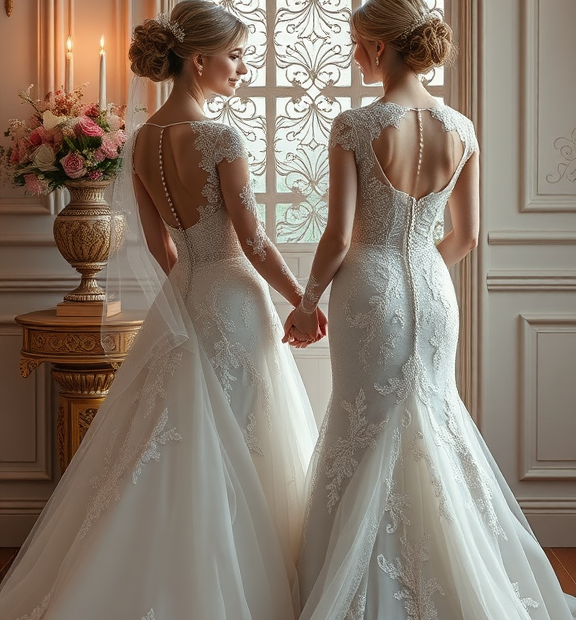The Evolution of Wedding Dresses: Trends Through the Decades
Wedding dresses have long been an embodiment of love, culture, and personal expression. Over the decades, the design and style of these gowns have transformed significantly, reflecting the societal trends and values of their times. Let’s take a closer look at the evolution of wedding dresses, exploring how each decade has contributed to today’s bridal attire.
1900s – Edwardian Elegance
In the early 1900s, wedding dresses were typically made from luxurious fabrics like silk and satin. Naturally, these dresses were predominantly white due to Queen Victoria’s influence, who famously wore a white gown for her wedding to Prince Albert. The typical silhouette featured high necklines, long sleeves, and trailing skirts, offering a modest aesthetic. Embellishments such as lace and beading were common, enhancing the opulent look.
1920s – Flapper Influence
The 1920s ushered in an era of breaking traditions. With the rise of the flapper culture, wedding dresses became less rigid. Shorter hemlines and simpler lines took center stage. The dresses reflected a newfound freedom, often featuring dropped waistlines and less corset-like structures. Fabrics like chiffon and georgette became popular, making way for more comfortable styles. Women celebrated their individuality with unique embellishments and headpieces like birdcage veils.
1950s – The Hourglass Silhouette
After World War II, the 1950s heralded a return to femininity with dresses that celebrated the hourglass figure. Iconic designers like Christian Dior brought forward styles characterized by voluminous skirts, cinched waists, and elegant details. Popular materials included tulle and lace, often adorned with ribbons and flowers. This decade also marked the rise of the white wedding dress as the standard, moving firmly away from the previous multi-colored styles.
1970s – Bohemian Vibes
The 1970s were all about freedom and individualism, which extended into bridal wear. Bohemian influences dominated this decade, with flowing, relaxed silhouettes. Many brides chose unconventional fabrics such as polyester or even cotton for their gowns. Styles often featured long sleeves and floral motifs, drawing inspiration from nature. The wedding gown was a canvas of self-expression, often flaunted with unique accessories, including flower crowns.
1980s – Glamour and Excess
The 1980s is remembered for its bold fashion choices, and wedding dresses reflected this exuberance. Dramatic silhouettes, including off-the-shoulder necklines and puffy sleeves, dominated the scene. Designer David Tutera even crafted towering gowns that had an essence of royalty. Fabrics became lavish, with satin and silk adorned with lace and beading, designed to captivate. The fixation on grandeur was cemented by celebrities who set trends and defined bridal fashions.
1990s – Simple and Chic
As the 1990s rolled in, simplicity became key. Brides started to favor sleek lines and minimalist designs over the opulent styles of the prior decade. Wedding dresses were characterized by simpler materials, progressively favoring fabrics like silk satin or chiffon. Slip dresses became iconic, representing a more laid-back, romantic approach to bridal fashion. Minimal embellishments further allowed the bride’s natural beauty to shine through.
2000s – Vintage Revival
Love what I do? Be a hero and help me keep creating awesome content!
Support My Mission Now!Every donation fuels more great stuff – thank you, legend!
The 2000s saw a revival in vintage styles as brides began to reconnect with the past. Many chose gowns inspired by the glamour of the 1920s and 1950s. Layered fabrics, lace accents, and intricate beading made a notable return. The fusion of traditional and modern elements created a unique aesthetic that spoke to both nostalgia and freshness. Popular designs included the A-line gowns and tea-length dresses that combined classic charm with contemporary flair.
2010s and Beyond – Personalization and Diversity
Today, wedding dresses are as diverse as the brides who wear them. The emphasis is on personalization where each gown represents the bride’s unique style and story. From minimalist designs to extravagant couture creations, brides now have the freedom to choose what resonates with them. There’s a trend toward incorporating colors and non-traditional silhouettes, reflecting an embrace of individuality and culture.
Love what I do? Be a hero and help me keep creating awesome content!
Support My Mission Now!Every donation fuels more great stuff – thank you, legend!
The journey of wedding dresses throughout the decades showcases a fascinating mix of tradition, innovation, and personal expression. Each era has contributed layers of meaning and style, making bridal fashion not just a clothing choice but a significant cultural statement. Whether you prefer vintage elegance or modern flair, there’s no doubt that the evolution of wedding dresses continues to inspire brides-to-be around the world.
Choosing the Perfect Wedding Dress for Your Body Type
Your wedding day is one of the most special days of your life, and finding the perfect wedding dress is a key part of that experience. A well-chosen dress not only enhances your beauty but also boosts your confidence while you celebrate love with your partner. To help you make the best choice, here’s a guide to selecting a wedding dress that perfectly complements your body type.
Understanding Body Types
Every body is unique, and understanding your body type is crucial. The common body types include:
- Hourglass: Balanced shoulders, a defined waist, and fuller hips.
- Apple: Broader shoulders, a fuller bust, and narrower hips.
- Pear: Wider hips and thighs, with a smaller bust.
- Rectangle: Straight body shape with minimal curves.
- Inverted Triangle: Broader shoulders and bust, with narrower hips.
Hourglass Body Type
Love what I do? Be a hero and help me keep creating awesome content!
Support My Mission Now!Every donation fuels more great stuff – thank you, legend!
If you have an hourglass figure, you’re in luck! This body type can pull off a variety of wedding dress styles. Look for dresses that emphasize your natural curves. A-line gowns, mermaid styles, and fitted dresses can beautifully showcase your shape. Consider designs with a cinched waist or a belt to add definition.
Apple Body Type
For those with an apple shape, the key is to create balance. A-line dresses work well, as they skim over your midsection and highlight your legs. Empire waist dresses with a high waistline can draw attention to your bust while flowing out gently. Lightweight fabrics can also enhance comfort without adding bulk.
Pear Body Type
Love what I do? Be a hero and help me keep creating awesome content!
Support My Mission Now!Every donation fuels more great stuff – thank you, legend!
If you’re a pear shape, you may want to highlight your upper body and shoulders. Consider wearing dresses with embellished or detailed bodices to draw the eye upward. A-line and ball gown silhouettes are also flattering, as they can help balance your curves while emphasizing your waist.
Rectangle Body Type
For those with a rectangle shape, it’s all about creating curves. Look for dresses that add volume and interest. Ball gowns and dresses with ruffles or layers can enhance your silhouette. Also, consider options with a defined waist, such as fit-and-flare or drop-waist styles. A sweetheart neckline can create the illusion of curves, which can be very flattering.
Inverted Triangle Body Type
If you have an inverted triangle figure, consider dresses with a flowing skirt to add balance to your silhouette. Styles like A-line or ball gown will help soften broad shoulders. Off-the-shoulder or V-neck dresses can draw attention downward, and flowy fabrics can enhance the feminine look.
Tips for Choosing Fabric and Color
The fabric choice can greatly influence the look and feel of the dress. Here are some popular fabric options:
- Satin: Smooth and shiny, great for structured silhouettes.
- Chiffon: Lightweight and flowy, perfect for an ethereal look.
- Lace: Adds texture and elegance, often used overlay.
- Tulle: Great for volume, used in skirts and overlays.
When it comes to color, while white is traditional, don’t shy away from other shades. Ivory, champagne, and even light pastels can create a unique and stunning look.
Accessorizing Your Dress
The right accessories can elevate your wedding dress. Delicate jewelry, a stunning veil, or intricate hairpieces can add personality and flair. Choose accessories that complement your dress style and personal taste. Remember, less can be more; you want to enhance your dress, not overshadow it.
Selecting your wedding dress is an exciting journey. By understanding your body type and knowing which styles work best for you, you can find the dress that makes you feel beautiful on your special day. Enjoy the process, embrace your individuality, and let your unique style shine through.
Conclusion
The journey of wedding dresses reflects not only fashion but also the changing values and cultural significance of marriage. From the iconic Victorian styles of the 19th century to the modern, minimalist designs favored today, each decade has brought new trends that cater to the evolving tastes of brides. Understanding this evolution can inspire your own choice, revealing how timeless styles can be adapted to fit contemporary tastes.
Selecting the right wedding dress for your body type is equally crucial. Every bride deserves to feel beautiful and confident on her special day. By understanding your unique shape and exploring designs that enhance your best features, you can find a dress that makes you shine. Whether you are looking for a full-skirted ball gown or a sleek, fitted design, there are options available that will not only flatter your figure but also reflect your personality and style.
Love what I do? Be a hero and help me keep creating awesome content!
Support My Mission Now!Every donation fuels more great stuff – thank you, legend!
By blending the rich history of wedding dresses with careful consideration of your body type, you can create a look that celebrates who you are. The perfect dress is more than just an outfit; it’s a statement of love, joy, and individuality. Embrace the journey of finding your dream wedding dress, knowing that it is a pivotal moment in your celebration of love. Remember, this dress is not just a piece of clothing; it is a symbol of your unique story as you embark on a beautiful new chapter in life. Enjoy every moment of this exciting process!

